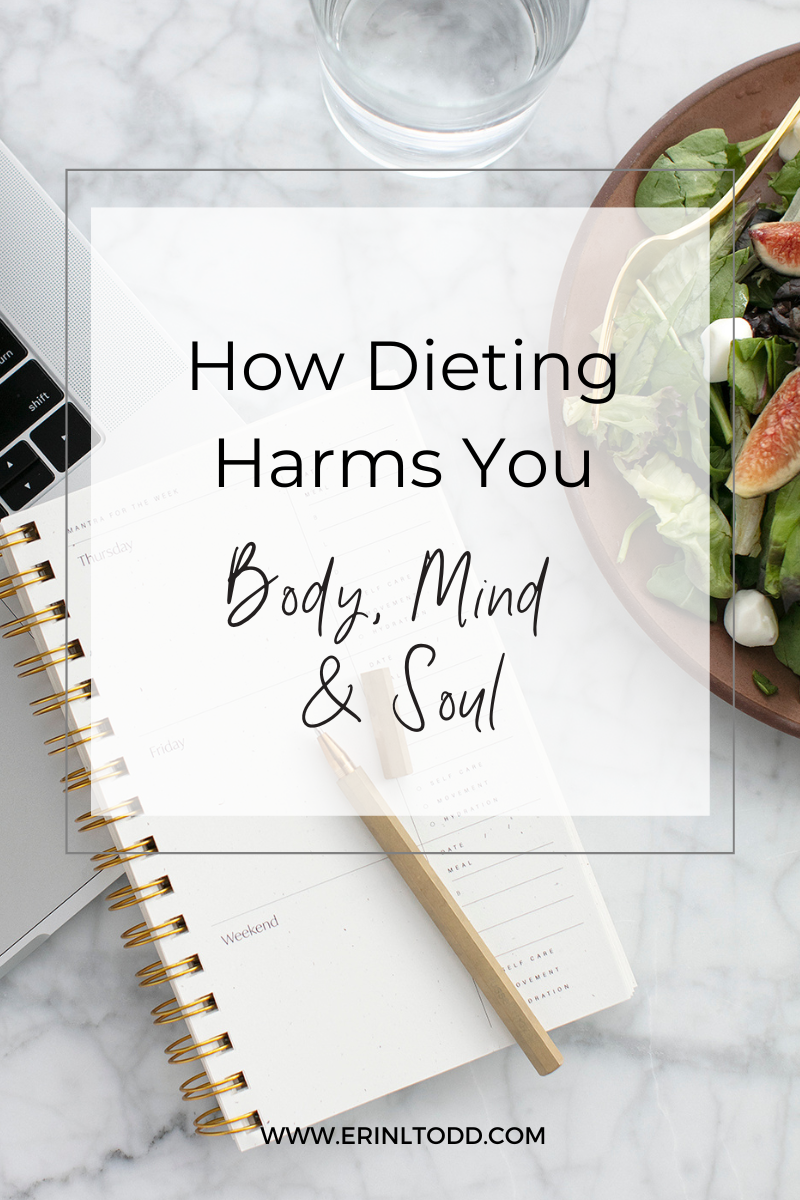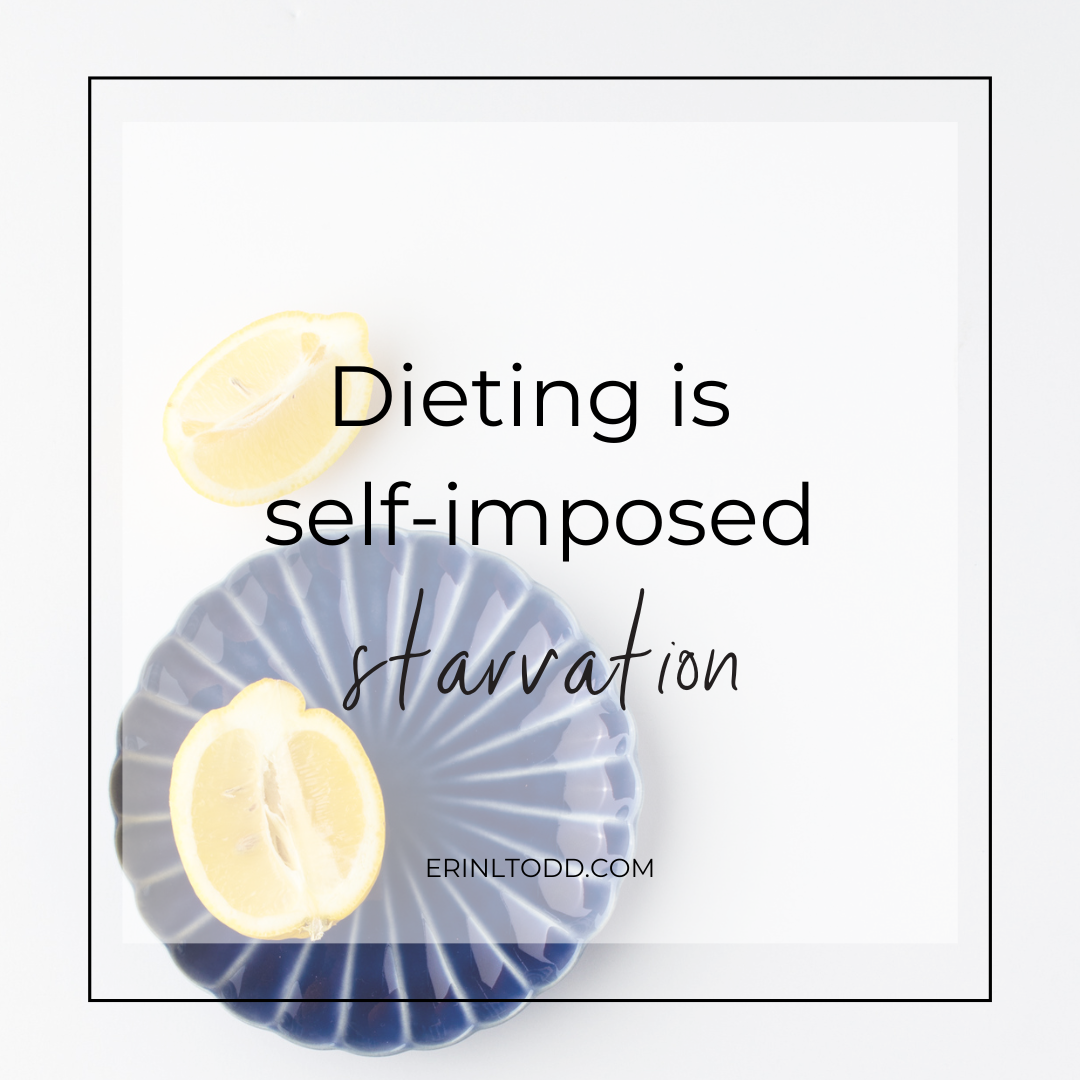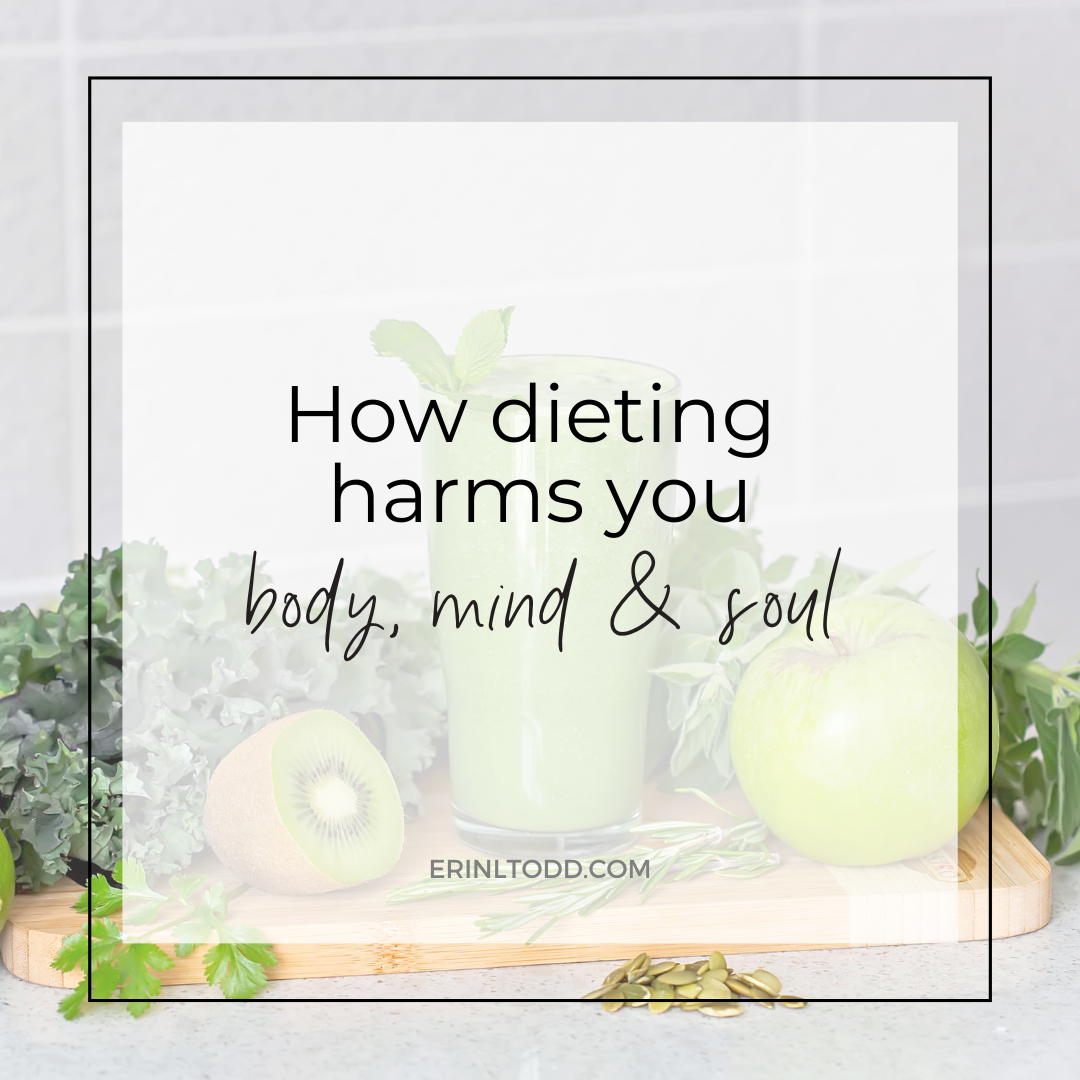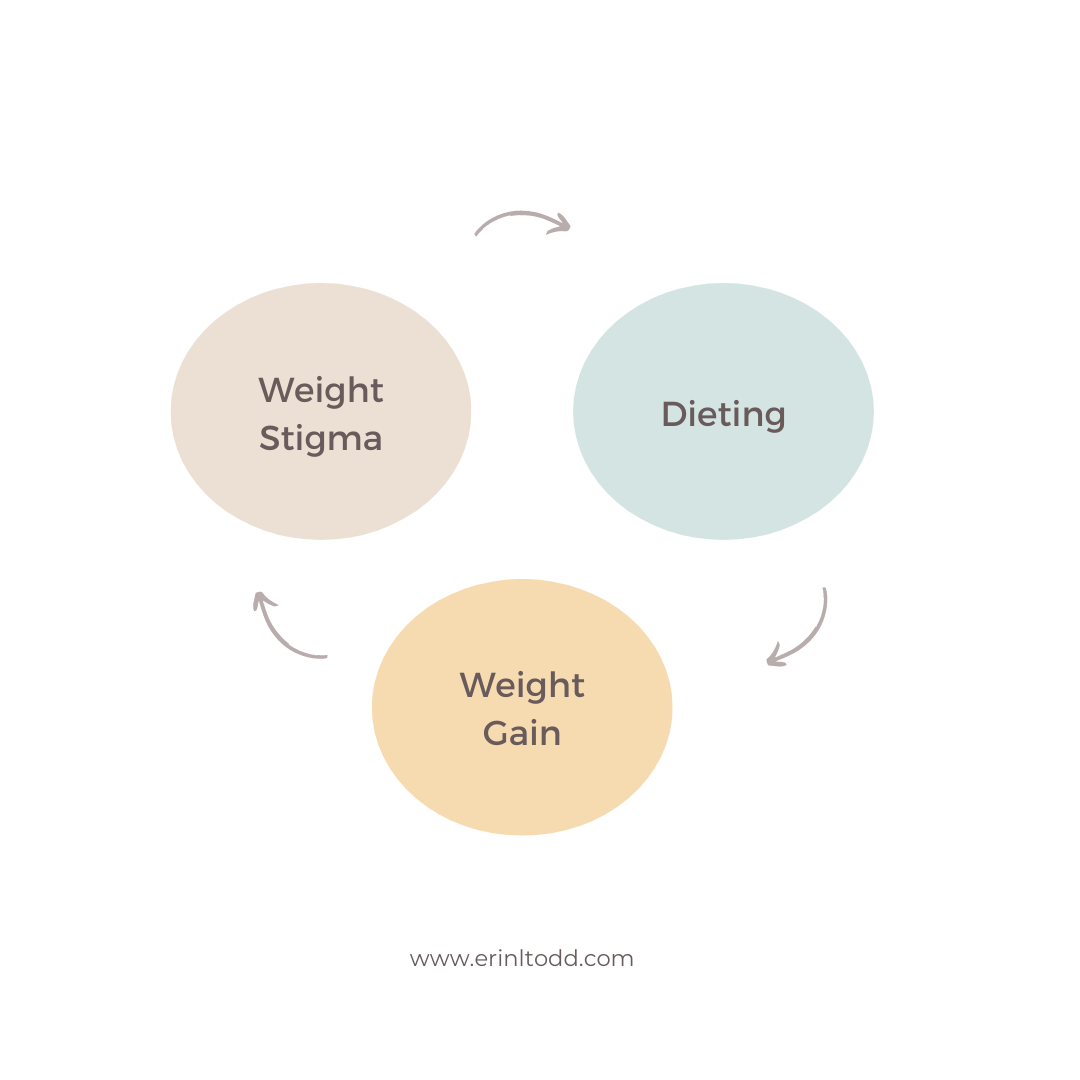How Dieting Harms You Body, Mind and Soul (Part 1)
You need to understand the health risks and overall life cost you face when chasing weight loss with your next diet, so this article will explain the scientific and biblical truth of how dieting harms you body, mind and soul.
You probably heard it before: diets don’t work. I’ve certainly said it before. But did you know that there is an even uglier truth about dieting that isn’t being talked about enough?
Not only does dieting not work, it actually harms you. In this article we’re going to unpack how the process of dieting harms you: body, mind and soul.
Before jumping in to the harm, let’s remember the first ugly truth and give it one more chance to actually sink in.
Diets Don’t Work
Diets don’t work. What do I mean by that?
An overwhelming body of research shows that 95% of diets are ineffective for lasting weight loss. I refer you to the books Intuitive Eating, Health At Every Size, and Anti-Diet for a deep dive into scientific studies and evidence for this conclusion.
So if you go on a diet to meet a weight loss goal, 95% of the time you’re not going to meet that goal.
“The majority of people who go on diets and lose weight gain it back, with many gaining even more weight. (Studies show that up to 2/3 of folks will regain more weight than they lost!)” (FN 1)
That’s a backfire in my book.
Further, studies have examined this backfire and reach the conclusion that dieting promotes weight gain, not weight loss. (FN 2)
“The relationship between dieting and gaining back more weight is so strong that an Australian National Health and Medical Research Council rated it level “A” evidence, which according to academic Fiona Willer is the scientific equivalent of smoking causing lung cancer!” (FN 3)
Speaking of scientific equivalent, with that 95% failure rate consider this: if dieting was treated like the equivalent of a prescription drug, it would not be allowed on the market.
The authors of Intuitive Eating explain it this way (FN 4):
If dieting programs had to stand up to the same scrutiny as medications, they would never be allowed for public consumption. Imagine, for example, taking an asthma medication that improves your breathing for a few weeks, but in the long run causes rebound asthma attacks and ultimately damages your lungs. Would you blame yourself for the medication not working, yet? Still continue to take it? Of course not! That’s what the process of dieting is like, even if your health care professional prescribes it. Would you really embark on a diet and (even a so-called sensible diet) if you knew that it would ultimately fail? The pursuit of weight is so problematic. It perpetuates weight cycling and harms your relationship with food, mind, and body.
Intuitive Eating
In spite of this 95% failure rate, we keep turning to diets. Why is that?!?
I believe the values of modern Western society coupled with the monstrously large business interests in play (aka diet culture) have something to do with it.
The global weight loss industry market is expected to reach 278.95 billion by 2023. (FN 5) So the fact that we keep getting sold on revamped and disguised versions of diets (i.e. “it’s not a diet, it’s a lifestyle!”) as the “answer” to all of our problems in life is (a) no surprise and (b) not going to stop anytime soon.
The enemy of our souls is having a field day in this context, which is why I always try to point out that diet culture is spiritual warfare.
Diet culture has lied to us, deceived us, and seduced us with the false gospel of weight loss and wellness.
We’ve been so focused on the perceived benefits promised by diet culture that we’ve become blind to how dieting is actually harming us.
To recap, dieting:
- Does not work for weight loss long term
- Is actually a predictor of weight gain
Not only that, now were about to see #3 how dieting also harms our health in the process.
That’s 3 strikes against dieting, in my book.
Let’s take a closer look at how dieting harms our physical health, mental health, and spiritual health in this blog post series.
For Part 1 of the Series, let’s begin with how dieting harms your body.

How Dieting Harms Your Body
Dieting Is Self-Imposed Starvation
It’s really quite simple: when you’re dieting, you are not eating enough food.
In this modern age of abundance and easy access to food, most of us will never experience a real famine. But when we cut our food consumption down to nearly nothing while on a diet, our bodies think we’re in a famine.
Our bodies can’t tell that we’ve chosen to starve ourselves by dieting and think we’re actually starving. So our body systems kick into high gear to try and keep us alive.
“Biologically your body experiences the dieting process as a form of starvation. Your cells don’t know you are voluntarily restricting your food intake. Your body shifts into primal survival, mode- metabolism, slows down and food cravings escalate. And with each diet, the body learns and adapts, resulting in rebound weight gain.” (FN 6)
This shift into starvation mode can be even more pronounced when you’re following a workout plan along with your diet. The inadequate fueling plus exercise depletes your body of the energy and nutrients it needs to function.
The Health At Every Size author explains how people who are suppressing their drive to eat while on a diet are miserable (FN 7):
“Experimentally underfed people experience lower energy levels, apathy, dizziness, intolerance to cold, slower metabolism, preoccupation with food, intense hunger and cravings, decreased sex drive, general irritability, and depression among other characteristics. Not a pretty picture – though incredibly effective at helping you conserve body energy. In today’s context, it may not be so reassuring to know you’re well equipped to survive food shortages. But this survival instinct sure as a valuable trait in the past!”
Health At Every Size
Here is the laundry list of what’s going on in your body while you diet. Dieting (FN 8):
- Slows the rate at which your body burns calories.
- Increases your body’s efficiency at wringing every possible calorie out of the food you do eat so you digest food faster and get hungrier quicker.
- Causes you to crave high-fat foods.
- Increases your appetite.
- Reduces your energy levels (so even if you could burn more calories through physical activity you don’t want to).
- Lowers your body temperature so you’re using less energy (and are always cold).
- Reduces your ability to feel “hungry” and “full”, making it easier to confuse hunger with emotional needs.
- Reduces your total amount of muscle tissue (and you may know that a pound of muscle burns more calories than a pound of fat).
- Increases fat-storage enzymes and decreases fat-release enzymes.
This laundry list probably seems incredibly frustrating to dieters, since it shows the many ways your body is compensating for your dieting efforts and fighting back from being starved to death.
We have to remember that this is the weight regulation system that God created in the human body. God designed our bodies to keep us alive in times of famine. It’s not designed to help us lose weight in times of plenty.
By dieting we attempt to interfere with God’s design for our weight regulation system. But as the Intuitive Eating authors note, “dieting can’t transcend biology” (FN 9):
Dieting is a form of short-term starvation. Consequently, when you’re given the first opportunity to really eat, eating is often experienced at such intensity that it feels uncontrollable, a desperate act. In the moment of biological hunger, all intentions to stick with a food plan are fleeting and paradoxically irrelevant. While intense eating may feel out of control, and unnatural, it is a normal response to starving and dieting.
Intuitive Eating
{Related Blog Post: Learn more about God’s design for our weight regulation system in Understanding Set Point Weight As a Christian}

Dieting Increases Your Risk for Weight Cycling
What is weight cycling? You may not have heard the term before, but if you’ve ever been on a diet you likely know the experience of the vicious cycle firsthand.
Anti-Diet author Christy Harrison describes it this way (FN 10):
Because of this pervasive cultural stigma, larger-bodied people are more likely to have tried to lose weight than their smaller bodied counterparts. Yet attempts at intentional weight loss don’t work in the long run, as we’ve discussed. Instead, these attempts most often lead to weight cycling – the yo-yo of weight loss and regain that’s all too familiar to most dieters – which, it turns out, is also bad for your health.
Anti-Diet
“Weight cycling itself is an independent risk factor for cardiovascular disease, inflammation, high blood pressure, and insulin resistance, yet it is seldom controlled for in many large studies that associate weight with health issues (Bacon and Amphamor 2011). Two large studies showed that weight cycling accounts for all the excess mortality that had been linked to body size.” (FN 11)
Weight cycling can make you more prone to certain diseases, in fact, “even a single cycle of losing and regaining weight may damage blood vessels and increase risk for cardiovascular disease.” (FN 12)
“The reasons for the association between weight cycling and poor health outcomes are still being investigated. One likely explanation is that weight cycling leads to fluctuations in blood pressure, heart rate, nervous-system activity, kidney-filtration rate, blood sugar, and blood lipids – all known cardiovascular risk factors.” (FN 13)
“When a person’s weight stays stable over time, by contrast, the individual generally does not experience the same kinds of fluctuations in blood pressure or other cardiovascular risk factors. (This holds true for people in bodies of all sizes.)” (FN 14)
We know that diets have a 95% fail rate when it comes to long-term weight loss. That means dieting is going to result in weight cycling for most people – make that almost all people. (FN 15)
As neuroscientist and author Sandra Aamodt puts it, “Almost all dieting is yo-yo dieting.” And from all the research we’ve just discussed, we know that yo-yo dieting negatively affects people’s health. So it truly is a vicious cycle: people pursue weight loss in a bid to improve their health, only to put it at greater risk; then, if they develop health problems, they’re told to lose weight to cure them. And so the cycle continues.
Anti-Diet

Dieting and Weight Stigma
It’s common knowledge that stress is bad for your health. Have you ever considered the toll that stress is taking on your health? How about the stress of dieting? Or the stress of having the “wrong” body?
Because of the relentless cultural messaging we receive about body size, weight and stress seem to go hand in hand. Looking closely at weight stigma can help us to realize just how damaging this has become.
While you might not have heard the term “weight stigma” before, you’re probably familiar with the concept because it pervades every aspect of the diet culture we live in. It all boils down to the diet culture mandate that “fat is bad”.
Weight stigma is the social devaluation of people because of their body weight. It includes the weight-based stereotypes and assumptions we are force fed by diet culture that people in larger bodies are “lazy, gluttonous, lacking in willpower, unmotivated to improve their health, and personally to blame for their weight.”
These stereotypes and assumptions play out socially in the form of bullying, prejudice, unfair treatment, and discrimination. In the Bible, this would be called injustice.
Research documents that fatter people face discrimination in employment (including lower wages), barriers in education, biased attitudes and lower quality of care from health professionals, stereotypes in the media, stigma in interpersonal relationships, and, overall, are judged negatively and treated with less respect. Weight discrimination has reached such great proportions that it now equals or exceeds discrimination based on race and gender.
Health At Every Size
(FN 16)
It’s easy to see how weight discrimination can be extremely damaging to mental and emotional health. But did you know the stress it causes can be damaging to our physical health as well?
“Stress from the discrimination and widespread hostility directed at larger people may also be a significant contributor to the risks currently blamed on body fat alone.” (FN 17) This means that while weight is portrayed as the culprit, stress may be getting away with murder.
Researchers find larger people experience more cynical mistrust, which is highly associated with inflammation, a major risk for heart disease. There is extensive research documenting the role of chronic stress in conditions conventionally described as obesity-associated, such as hypertension, diabetes and coronary heart disease. Stress itself alters metabolism independent of changes in BMI.
Health At Every Size
(FN 18)
That last point about stress bears repeating – stress itself alters metabolism independent of changes in BMI. In other words, stress is having an effect all on its own that does not depend on changes in BMI. Regardless of what’s happening with your weight, stress is taking a toll on your body.
Culturally imposed weight stigma itself may put us at risk for poor health outcomes. “Cross-cultural studies suggest that larger people are not subject to the same diseases in countries where there is less stigma attached to weight.” (FN 19)
How fascinating that other countries with less stigma experience less disease. Meanwhile, in this country, the physical health of many suffers under the oppression of diet culture.
“In the United States, there is a stronger relationship between BMI and morbidity (disease) and mortality (early death) among groups more negatively affected by body image concerns (younger people, Caucasians, and women).” (FN 20)
Our beliefs about our own weight (and what we think that weight “should” be) often reveal how we have internalized weight stigma coming from diet culture.
When researchers looked at a nationally representative group of more than 170,000 U.S. adults, they found the difference between actual weight and perceived ideal weight was a better indicator of mental and physical health than BMI. In other words, feeling fat has stronger health effects than being fat.
Health At Every Size
(FN 21)
Weight stigma serves as stress. Stress increases disease risk. Many people who experience weight stigma turn to dieting in an attempt to escape the stigma. Dieting inevitably results in weight gain. More weight means more stigma. The cycle of harm continues.

For a deeper dive into the science of weight stigma check out the article The Harm of Weight Stigma by Ragen Chastain of the Weight and Healthcare newsletter. Ragen has a gift for explaining scientific studies in an accessible way and this article really highlights that, as she digs into the published research and provides an easy to understand (and alarming) breakdown of several recent studies on weight stigma.
How dieting harms your body
To recap Part 1 of this series How Dieting Harms You Body, Mind and Soul, let’s review the ways dieting damages your physical health.
Diets Harm Your Body
- Dieting starves your body
- Dieting increases your risk for weight cycling
- Weight stigma is a stress that damages your health
Your body needs food to function and live. While dieting might be a choice for you, your body reacts like its an involuntary famine and fights to keep you alive. In essence, dieting is self-imposed starvation.
Dieting leads to weight cycling, the classic yo-yo of initial loss and subsequent regain nearly every single dieter has experienced. Weight cycling is hard on the body, especially on the cardiovascular system, and can make you more prone to the very diseases that are often blamed on body weight.
Living in this body-obsessed diet culture and experiencing weight stigma is stressful. This stress takes a toll on not just your mind, but your body too.
The research shows that dieting doesn’t deliver on its promise of weight loss and it actually harms what it claims to improve: our health.
Despite the scientific evidence that stands against it, the diet culture message persists and is often the loudest voice in the conversation. Diet culture lures you in with lies and traps you in a prison.
One of my favorite quotes from Anti-Diet, that bears repeating until we can see dieting for what it truly is, states: “So it truly is a vicious cycle: people pursue weight loss in a bid to improve their health, only to put it at greater risk; then, if they develop health problems, they’re told to lose weight to cure them. And so the cycle continues.” (FN 22)
I want you to know that there is a better way to care for yourself. You don’t have to harm your body with dieting. The cycle can stop for you anytime you are ready let go of the cultural prescription of what a body should look like and start pursuing actual health – body, mind and soul. There’s a non-diet approach to health and it’s called intuitive eating.
Stay tuned for the next installment of the series: How Dieting Harms You Body, Mind and Soul (Part 2) where we will explore how dieting harms your mental health. I will link to that directly from Part 1 once it’s released.
In the meantime, to learn more about the ugly truth of diets, I refer you again to the three books cited in my introduction to this blog post, which are cited to below in the Footnotes: Intuitive Eating, Health At Every Size, and Anti-Diet . These books are on my recommended reading list and offer a deep dive into scientific studies and evidence for the futility and harm of dieting.
To learn more on this topic specifically from a faith-based perspective, you can explore the rest of my blog starting here or listen to my podcast Intuitive Eating for Christian Women (pro tip: listen in order, from the beginning for maximum learning).
intuitive eating for christian women
FOOTNOTES
FN 1 Intuitive Eating 4th Edition Fully Revised and Updated by Evelyn Tribole and Elyse Resch, Introduction xvii
FN 2 Intuitive Eating, p. 29
FN 3 Intuitive Eating, p.28
FN 4 Intuitive Eating, p. 28
FN 5 Intuitive Eating, Introduction xvii
FN 6 Intuitive Eating, p. 30
FN 7 Health At Every Size: The Surprising Truth About Your Weight Revised & Updated by Linda Bacon, PhD, p. 47
FN 8 Health At Every Size, p. 49
FN 9 Intuitive Eating, p. 25-26
FN 10 Anti-Diet: Reclaim Your Time, Money, Well-Being, and Happiness Through Intuitive Eating by Christy Harrison, MPH, RD, p. 144
FN 11 Intuitive Eating, p. 29
FN 12 Health At Every Size, p. 130
FN 13 Anti-Diet, p. 145
FN 14 Anti-Diet, p. 145
FN 15 Anti-Diet, p. 146
FN 16 Health At Every Size, p. 312
FN 17 Health At Every Size, p. 131
FN 18 Health At Every Size, p. 131
FN 19 Health At Every Size, p. 131
FN 20 Health At Every Size, p. 131
FN 21 Health At Every Size, p. 131
FN 22 Anti-Diet, p. 146
